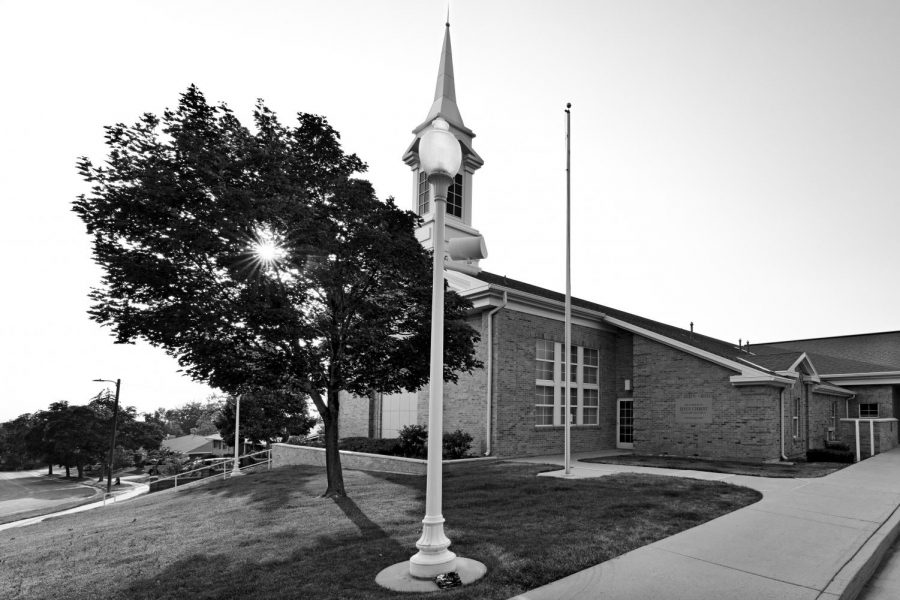Jarvis: Utah Culture Fosters Violence Against Women
Local Mormon church near Foothill Drive on Sunday, July 11, 2021. (Photo by Kevin Cody | The Daily Utah Chronicle)
March 17, 2023
Utah has a violence problem. Forty percent of adult homicides in Utah are domestic violence related, and females make up the overwhelming majority of homicide victims. One in three Utah women experience sexual assault in their lifetime, a statistic higher than the national average. Sexual assault and domestic violence often intersect, as many violent partners are also sexually abusive.
In January, a man named Michael Haight killed his family in Enoch, Utah. Soon after, we learned that he had previously been investigated for abuse. In 2020, his daughter Macie reported that he had assaulted her several times, including choking her — a red flag for homicide — and said that she was afraid he would kill her. Officers then learned from Tausha, Macie’s mother, that there was a gun in the house, making her six times more likely to be killed than other abused women. Still, Tausha’s lethality assessment concluded with police officers deeming her not in high danger.
More than half of all Utah victims who died from intimate partner violence had a known history of reporting partner violence to authorities. But Utah law enforcement isn’t properly trained for domestic violence and cannot be trusted to evaluate safety. We should rely on social work approaches instead.
The Haight case is just one example of many violent crimes perpetrated in Utah. If this state’s culture didn’t instill harmful gender roles that give power to cisgender men, it might have been prevented.
Though the Church of Jesus Christ of Latter-day Saints officially states that they do not tolerate abuse, in practice, it happens frequently within the church, especially against women and children. The roots of violence in Utah are enforced early on by church doctrine and a lack of comprehensive sexual education.
Church Doctrine
The LDS church teaches harmful ideals, such as the notion that men are not in control of their sexual impulses and that women become pornography if they dress immodestly. This puts the blame on women for men’s actions.
We see this ideal in Utah’s family life. It’s common for murdered families like the Haights to have had uneven power dynamics. The religion teaches that men have authority in the home, and that members must obey their leaders — who are always men, except for the leaders of children and women’s groups.
Members of the church confess to their bishop for sex outside of marriage. This reinforces the idea that sex is a “sin,” and causes many victims of sexual assault to feel at fault. Bishops add to the violence by blaming or silencing victims who do speak up. The leaders also have no obligation to report abuse due to the state’s clergy-penitent privilege. Instead, they call the church’s help line, which “never [advises] a priesthood leader to report abuse” and determines “whether the calls should be referred to the lawyers.” Church leaders are trained to be on the perpetrator’s side, if they aren’t the perpetrator themselves.
I spoke with Margaret Toscano, who has researched LDS feminism for several decades. She believes that even though the religion has made slight changes in the way they treat women, these changes are not “enough to let a woman develop her full personhood within the context of the church.” This may lead women to define their personhood by their husband and children.
Toscano also thinks this extends outside of the church, especially into state legislature. The prevalence of the religion in Utah means that church ideas become inextricably linked to the culture and dominate Utah’s government.
Lack of Education
If children don’t learn about healthy relationships and sex from their families or communities, they need to learn these things at school. Utah’s LDS-dominated government fails to provide this kind of education, however. Sex education remains entirely abstinence-based and instruction on consent is not required. Only “refusal skills” are taught, furthering the victim-blaming mentality. It also means that perpetrators could sexually assault someone without even knowing it.
The taboo around sex in Utah’s culture creates a dangerous setting in which victims don’t fully understand what happened to them. I spoke with several Utah high school students and was disturbed by the number of women and non-binary people who stated that they had been sexually assaulted while in high school. Among these students, most didn’t fully understand consent at the time nor were even aware that what happened to them was assault until later.
Church ideals heavily influencing the government and education makes it easy for other state institutions — such as police — to ignore violence against women, maintaining a cycle of harm.
The Need for Change
Some changes can reduce violence and prevent more domestic violence fatalities. Most vitally, proper education on consent and healthy relationships is necessary in Utah schools and in church settings. The LDS church will always bear some responsibility for violence in Utah if they continue to teach, both explicitly and implicitly, that men have more value than women.
As for secondary prevention, every reported situation of domestic violence should be an intervention point if police receive proper training to intervene and act with urgency. S.B. 117 recently passed, requiring law enforcement to conduct lethality assessments when responding to domestic violence reports. This is a good start, though we saw with the Haight family that lethality assessments are not enough. Social workers should speak with victims to help assess lethality. Doctors and OB-GYNs should regularly screen women for abuse, too.
The U.S. has a serious problem with violence against women. But Utah’s dangerous LDS teachings, combined with a lack of education in school, makes it easy for abusers to abuse and difficult for victims to speak up.









Mom • Dec 17, 2023 at 3:54 pm
This article is full of untrue and biased statements towards the Church of Jesus Christ of Latter Day Saints. It is untrue that there is more domestic violence in the church and we are not taught that we must always obey our leaders. LDS Children do not need to be taught the truth of sex by schools. We are perfectly capable of teaching our children that on our own. We believe children should know how reproduction works. Just because someone has different beliefs that you does not make them wrong or in need of your saving.
Broderik • Apr 18, 2023 at 3:50 pm
This was eye-opening, thank you for writing this. It’s shocking how this culture is allowed to thrive without question.